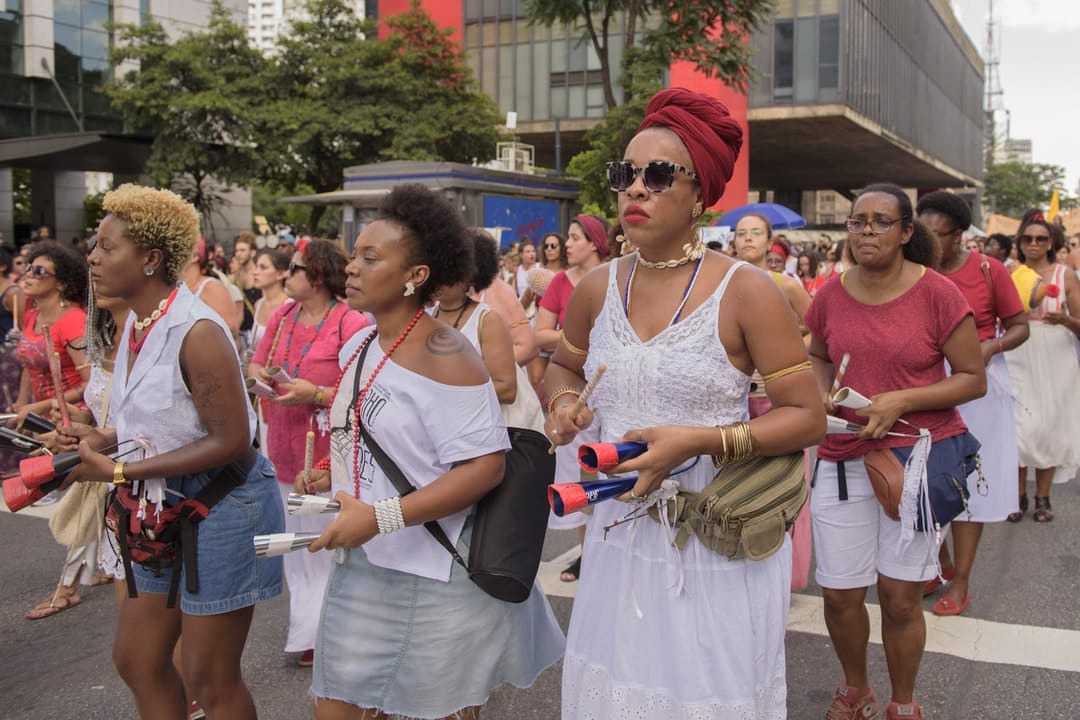
In 1983 Brazilian pharmacist Maria da Penha was shot by her husband while she was sleeping. da Penha survived this attack and her husband subsequently attempted to electrocute her while she was in the shower. The two attacks left her a paraplegic.
da Penha’s ordeal did not end there. It took seven years before her husband was first tried in the courts, and although he was sentenced for 15 years, the conviction was overturned on appeal. He was later tried two more times – once in 1996 and again in 2001. In the end he served only two years in prison.
da Penha filed a complaint with the Inter-America Commission on Human Rights, in which she accused the Brazilian Government of neglecting victims of domestic violence. She was finally vindicated in 2006, when Brazil introduced the Maria da Penha law. Its ground-breaking provisions include the establishment of domestic violence courts, and the requirement that 24-hour shelters be provided for victims.
Women-only police stations and the crime of femicide - the killing of women and girls because of their sex - have also been introduced in Brazil. (Fifteen Latin American countries have femicide on their books, the crime is endemic in the region.) Last year four women a day were killed in Brazil.
The Maria da Penha and femicide laws have certainly raised awareness of gender-based violence in Brazil, but they have also been resisted by authorities. According to Human Rights Watch, for example, only 74 domestic shelters exist in Brazil, which has a population of 200 million.
Last year the Inter-American Commission on Human Rights voiced a protest at Brazil’s lack of progress: “It is inadmissible that women with protection orders are murdered, that they do not have sufficient shelters or that their complaints are not taken into consideration,” it said.
Brazil is number five on an international ranking of female homicides; its per capita rate of female homicides is eight times greater than Australia’s. At the same time, many of Brazil’s laws and approaches to gender-based violence are the most progressive in the world.
An exchange of ideas and approaches
Last December the Monash Gender and Family Violence Prevention Centre hosted a delegation of family violence experts from Brazil. The visit was sponsored by the Australian Embassy in Brazil and funded by the Council on Australia Latin America Relations within the Department of Foreign Affairs and Trade.
The visit followed an exchange of Australian family violence experts to Brazil earlier in 2019 that was funded by the Australian Embassy in Brazil. Professor Jude McCulloch (Monash), Dr Heather Nancarrow (CEO, Australia’s National Research Organisation for Women’s Safety), Professor Kerry Carrington (Faculty of Law, Queensland University of Technology), Dr Lisa Harris (Public Policy, RMIT) and Dr Jasmine McGowan (Monash), were delegates. The reciprocal visits seek to develop a collaborative domestic violence research network between Australia and Brazil.
Researchers at the Monash Gender and Family Violence Prevention Centre are interested in examining the similarities and differences between Australian and Brazilian policies. What works? How are the policies implemented? How are they resisted?
Political and historical differences between the two counties are reflected in how measures to combat gender-based violence have developed and the forms they have taken – with local women’s activism and feminist analysis playing an important role in both places.
In Brazil, for instance, measures designed to assist women are seen in the context of human rights. One reason for this is that Brazil’s Constitution is relatively new. It was passed in 1988 after free elections were held in 1985 following the removal of a military dictatorship.
In some cases, Brazil takes a more health-based approach to family violence than Australia, so for example some violent perpetrators may receive individual health-based treatments that address underlying issues such as sexually transmitted infections. This approach has been shown to reduce violence.
Provisions to keep victim/survivors of violence in work and to provide further government support and assistance if needed are included in the Maria da Penha laws.
Other Brazilian measures that might prove useful in Australia are technologies to monitor risk and manage safety responses. For example, in some areas women who have intervention orders in place have access to a smartphone app allowing them to contact police directly and discreetly when they feel threatened.
Brazilian women who are exposed to violence are offered multiple ways to access support and safety management without activating the criminal justice system. This is important because women often want the violence to stop but want to stay with their partners and don’t want to report to police.
Approaches to mothering in the context of violence also differ. In Australia, women, especially First Nations women who have experienced family violence, have often had their children removed, whereas this rarely happens in Brazil.
Australian researchers are interested too in the political backlash to Brazil’s enlightened policies under President Jair Bolsonaro.
The President has de-emphasised gendered crimes such as family violence and femicide and support for women’s equality in favour of support for traditional family structures.
Backlash is also an issue in Australia where the Federal government is conducting an inquiry into the family law system based on the allegation that women lie about family violence.





